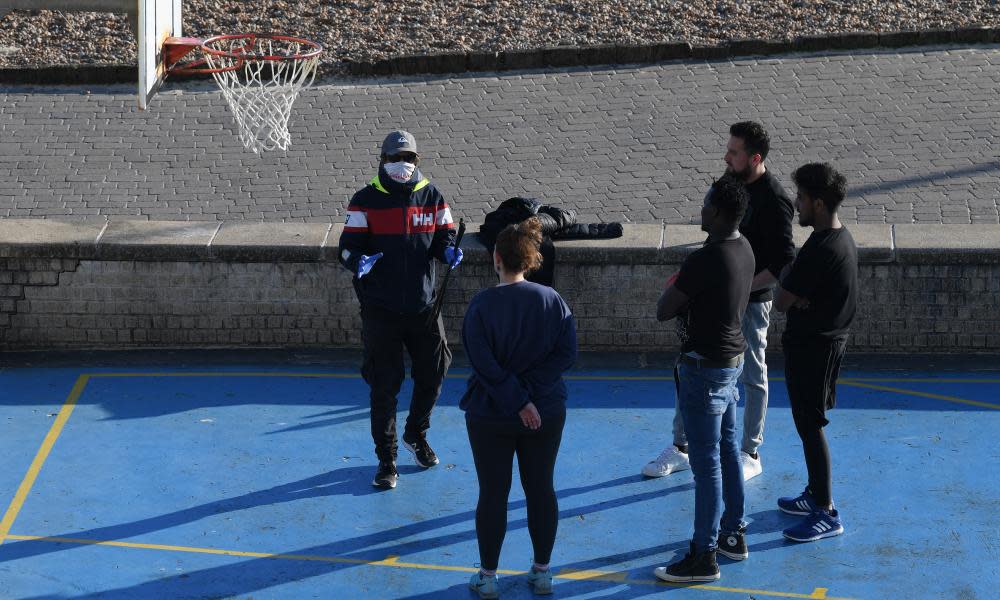Government must act to stop Covid fallout from killing grassroots sport

Is sport overwhelmingly a force for good? In the days of Boy’s Own and brilliantine the answer would have been an unblinking yes. Now it comes with caveats and hesitations.
Watching PSG in the Champions League final was another reminder of how Gulf states use sport the way a grand illusionist employs misdirection, diverting eyes and capturing souls.
The global gymnastic abuse scandal rumbles on. And for every Marcus Rashford, rousing politicians to eventually do the right thing with his campaign to extend free school meals, there is a Harry Maguire, making headlines for a more unsavoury incident.
Related: 'I was the king of sabotage': Ronnie O'Sullivan on controversy, comebacks and becoming a carer
One reason why elite sport returned so quickly from lockdown – aside from having the financial clout to create biosecure bubbles – is because it is seen as having a positive influence on wider society. The reality, as compelling research in the journal Sport in Society makes clear, is more complex.
Studies in the US and Australia have found that many sporting teams feature a disproportionately high number of players with criminal convictions. British researchers who recently interviewed a number of male professional athletes who had committed crimes during or after their careers, found they often felt normal rules did not apply to them. As one put it: “As a footballer you think you are infallible, I use the word untouchable.” Another remarked: “So it isn’t that you aren’t aware of the consequences of things, but of course the consequences don’t apply to you.”
We cannot necessarily trust sporting bodies to do the right thing either. Not when the likes of the world championship medallists Becky and Ellie Downie talk of cruel behaviour in the British Gymnastics system being “so ingrained in our daily lives it became completely normalised” in an “environment of fear and mental abuse”.
That poison also seeps further down the chain. Research has found “sexual harassment in sport was so pervasive even students studying sport science and sport journalism were more likely to be sexually harassed than students in other disciplines”. The academics Terry Engelberg and Stephen Moston also suggest sports programmes aimed at reducing or preventing youth crime are often “propelled by a sort of aggressive optimism” rather than rigorous evidence.
So sport is far from perfect but when it comes to the grassroots there is much to shout about – and so much that needs to be shouted about. We know the benefit activity has on physical and mental health, on savings to the NHS, and on improvements in education outcomes. Research by the academic Stephen Brosnan on the effect of sports participation on crime in England, suggests it has a benefit there too.
After crunching statistics on property and violent crime across 323 local authorities from 2012 to 2015, along with surveys detailing levels of adult participation in sport and activity, Brosnan found “a 10% increase in sports participation is associated with a fall in violent crimes between 0.97 and 1.56% … and a fall in property crimes of approximately 0.65%”.
As he notes, more research is needed on what is a complex and multidimensional problem. One study, on the impact of officially sanctioned midnight basketball leagues on crime rates in the US, showed violent crime rates dropped by approximately 90 offences per 100,000 in cities with them compared to those without.
However research in Minnesota found the relationship between athletic involvement and crime varied significantly depending upon the types of crime examined – with shoplifting decreasing but drunk driving increasing.
Of course sport plays a distant second fiddle to socio-economic factors. No one denies that. In his research Brosnan found “a 10% increase in the unemployment rate is associated with a fall in the violent crime rate by between 5.3 and 6.2%”. Yet grassroots sport does so much unseen good, from preventing youths joining gangs through to helping keep the elderly active.
Governments know this. Organisations know this. And yet at grassroots and local levels the system is creaking because of coronavirus.
Related: Leading athletes write to government for clarity on children's sport funding
According to UK Active, many gyms and swimming pools fear they will have to close for good, especially if there is a second wave. Meanwhile Sport England, which has invested heavily to help the grassroots, notes there has been a greater drop-off in sporting activity among women and lower socio-economic groups. It also fears these losses will be permanent as people lose the habit and the opportunity to take part in sport.
But while the government talks a good game about tackling obesity and protecting the NHS it does not seem to want to join the dots – or loosen the purse strings – when it comes to funding the sports sector.
There is still time for things to change. Next month a number of sporting bodies will come together to launch the first ever Great British Week of Sport. Their aim is two-fold. First, in the words of UK Active’s Huw Edwards, “To showcase the power of sport and physical activity to drive positive change and tackle societal challenges the nation faces.” The other hope is it may yet gently persuade the government to administer the smelling salts to a sector that has been beaten up during the pandemic, allowing it to survive – and, over time, help the rest of us thrive.

 Yahoo News
Yahoo News 
